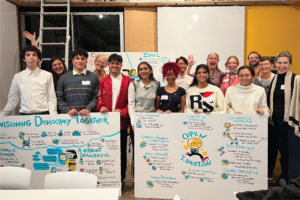Robert Hawkins: The Rise of Education Gaming

- Image via Wikipedia
Here is our interview with Robert Hawkins, a senior education specialist with the World Bank. We discuss the impact of the massive-multiplayer online game EVOKE on the future of public education. What lessons can social gaming on the web provide education reformers and planners of the next iteration of the public education?
Can you give us some stats on registrations for the game, how man countries have players involved, and how many people play it on an average basis? What kind of data have you been able to collect from the user experience?
By the time the EVOKE adventure ended 19,324 people from over 150 countries registered to play, far exceeding expectations. Players submitted over 23,500 blog posts (about 335 each day), 4,700 photos and over 1,500 videos. The site received over 178,000 unique visitors and 2,345,000 page views with time per visit averaging over eight minutes. For the month of March EVOKE generated just under 10% of what the World Bank’s entire external website generated with regard to page views (1.1 million versus 12.1 million).
The development team also recently met to review the season — we have posted the lessons learned here.
We understand what Evoke is to the gaming culture and the social web, but what do you think it is, or can be, to public education?
I think public education needs to get a lot more creative in the way it reaches students — both inside and outside of the classroom. With EVOKE we wanted to see how an online learning community focused on social innovation could address a number of educational questions that secondary schools and universities both in African and around the world are struggling to employ. We developed EVOKE with a number of these questions in mind:
- Could we create an educational game that engaged students in developing 21st century skills?
- Could we create an on-line learning environment as engaging as a good novel or movie and use narrative as a pedagogical device?
- Could we create a global classroom where students would learn from others around the world?
- Could we focus learning on action and doing in the real world?
- Could we focus discussion and learning on real world global challenges?
- Could we use gaming techniques as incentives to help drive and motivate the learning process?
- Could we use social networking to foster peer-peer learning and collaboration — globally?
- Could we use a network to engage in peer assessment and feedback?
- Could we tap into the large number of hours that young people spend gaming and divert some of that time to learning?
- Could we create a learning network where instead of a 30,40 50 100 to 1 student teacher ratio, each player could have 1, 2, 3, 4 mentors/facilitators?
Part of the Evoke experience is self-actualization. What’s your take on how virtual gaming brings about self-actualization?
We developed the quests for this purpose — for learners to ask questions about themselves and their internal motivations so as to better understand what drives them and where their passions might lie. I think virtual gaming, can help learners think about who they are and who they want to become. I think creating a network of players who played EVOKE because they are interested in global issues and development provided as community for learners to engage with a large diversity of individuals to both get feedback on their own passions but to also open their minds to how others around the world are living their lives and trying to make a difference. Below are some good quotes from players interviewed for the evaluation:
“I got to see things I would not have unless I went out actively searching for them. A lot of knowledge has been imprinted in my mind from some of the activities. Now I can delve deeper into certain topics, talk about them and do something about them, which I couldn’t have before.”
AND
“I live in small university town so by playing EVOKE I got to look beyond the bubble I live in. You hear about stories in the news and read about them in the paper but now I actually got a chance to give my opinions, to see the bigger picture and to see things beyond the small town I live in. It opened my eyes to a lot of things let me put it that way.”
AND
“Evoke gave a safe place to put the idea out there and when no-one laughed but actually had good things to say it gave me the confidence to approach others…so I can only imagine that there are many students out there with similar ideas, but without the confidence to pursue them.”
I think this last quote is particularly telling about the potential of virtual games for self-actualization. It provides an platform for sharing ideas and visions and the feedback needed to encourage players to take a chance on an idea that could easily be rationalized away as crazy or impossible.
Could you weigh in on the impact of Internet and smart phone adoption in regions like Asia, and the meaning that brings to social gaming on the web?
Mobile gaming and mobile learning will be a huge and growing field — not just in Asia but globally. I think it will open up many more opportunities for just-in-time learning; geo-spatial learning, interactive learning/gaming connecting to both the physical environment as well as with others, etc. I think there will be a lot of interesting applications coming in the near future melding the capacities of smart phones, education and entertainment.
Is this possible or not: the use of social gaming in a rich web experience will allow users to circumvent the traditional understanding of the global economy and geo-politics by having a more “personal” experience with other cultures. What’s your spin on it?
There is no doubt that the Internet and social applications are allowing for more direct interaction and debate on global issues among individuals. It is also allowing more access to the thinking, traditions, histories, etc of other cultures. I think one major challenge is still the language divide and the amount of culture and cultural understanding that is part of speaking another language.
What do you think is needed to bring a 21st Century mentality into education, and to make it actually have a structure like a 21st century education?
I think a big challenge is how we assess learning and the existing structures for assessment around the world that often end up wagging the proverbial dog. There is some very interesting progress around personalized learning, use of data to better focus learning, and better defining how to assess 21st century skills such as creativity, teamwork, etc. But, many innovative pedagogies never get integrated into a classroom because it is either not going to be tested or the curriculum is already overloaded. So, they are done as extracurricular activities.
Teachers are obviously central to this challenge (along with school leaders). Teachers need to be empowered and incentivized to integrate new ways of teaching and learning. I think another area will be to open up our definition of a teacher and find ways to bring a diverse range of experiences and expertise into the learning process. I think the teacher will continue to be the most important aspect of a quality education but technology allows for a broader array of voices/actors to also engage.
Related articles by Zemanta
- Teaching to Diverse Learning Styles in the Classroom (brighthub.com)
- Just In Case You Missed It: Reform Symposium 2010 (angelamaiers.com)
- Forget University – Use the Web For Education, Says Gates (news.slashdot.org)
- Scientific Learning Hosts Fall Webinar Series: Differentiated… (businesswire.com)
- Building an Amazon for Education (edreformer.com)
- Types of Learning Styles and Special Education (brighthub.com)
- Constructivism and Its Application to Game-Based Learning Activities (weber.k12.ut.us)
- The Ed Games We Play (edreformer.com)








Bill Belsey
Hello,
As an early adopter and strong proponent of ICT in education, I have long believed that computer/video games can play an important role in supporting and enhancing teaching and learning.
For some time now, I have tried to walk the walk of this belief with my own students, see http://www.coolclass.ca. I also know that there are many other educators who may have an interest in using games with their own students,
but are not sure where to start, or know what current research is telling us.
It is with the goal of encouraging and supporting fellow my educators that I created a free Moodle-based online course, "Learning With Gaming for Educators"
at http://www.wecanlearnonline.com.
I would be most grateful if you would share this resource your contacts and networks as you may deem appropriate.
Sincerely,
Bill Belsey
P.S. If you would like some further information about my background with respect to ICT and education, you would be most welcome to visit http://is.gd/chO0U.
Bill Belsey
Hello felow educators,
As an early adopter and strong proponent of ICT in education, I have long believed that computer/video games can play an important role in supporting and enhancing teaching and learning.
For some time now, I have tried to walk the walk of this belief with my own students, see http://www.coolclass.ca. I also know that there are many other educators who may have an interest in using games with their own students,
but are not sure where to start, or know what current research is telling us.
It is with the goal of encouraging and supporting fellow my educators that I created a free Moodle-based online course, "Learning With Gaming for Educators"
at http://www.wecanlearnonline.com.
I would be most grateful if you would share this resource your contacts and networks as you may deem appropriate.
Sincerely,
Bill Belsey
P.S. If you would like some further information about my background with respect to ICT and education, you would be most welcome to visit http://is.gd/chO0U.